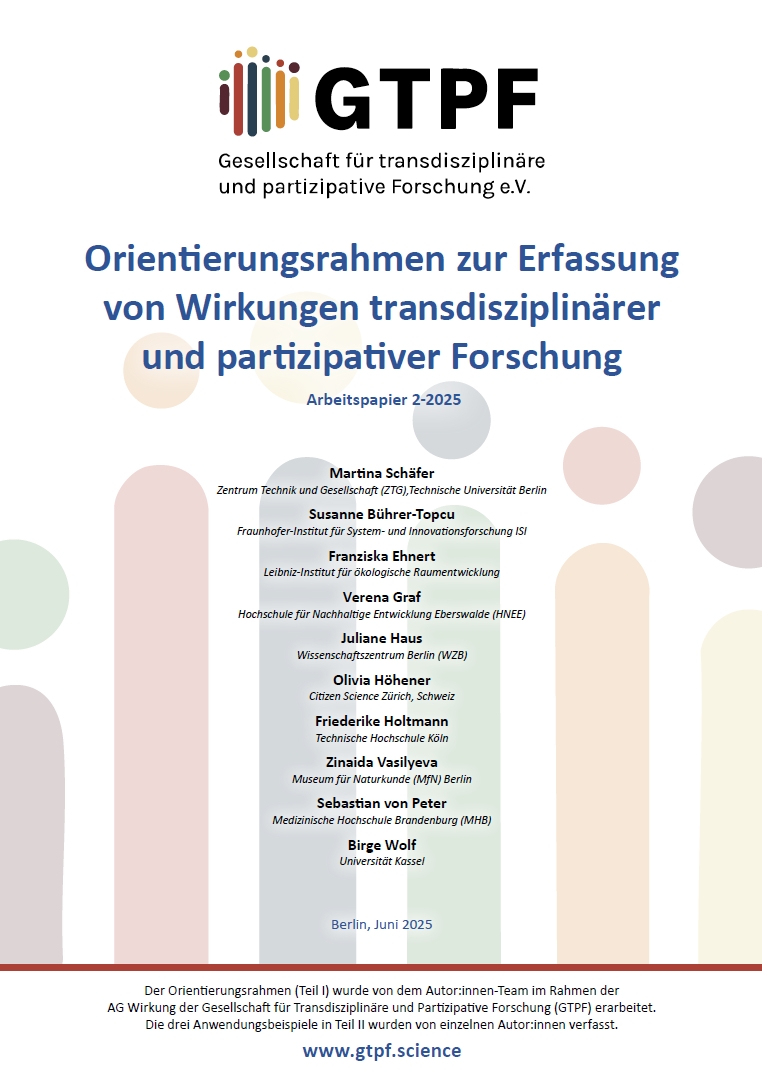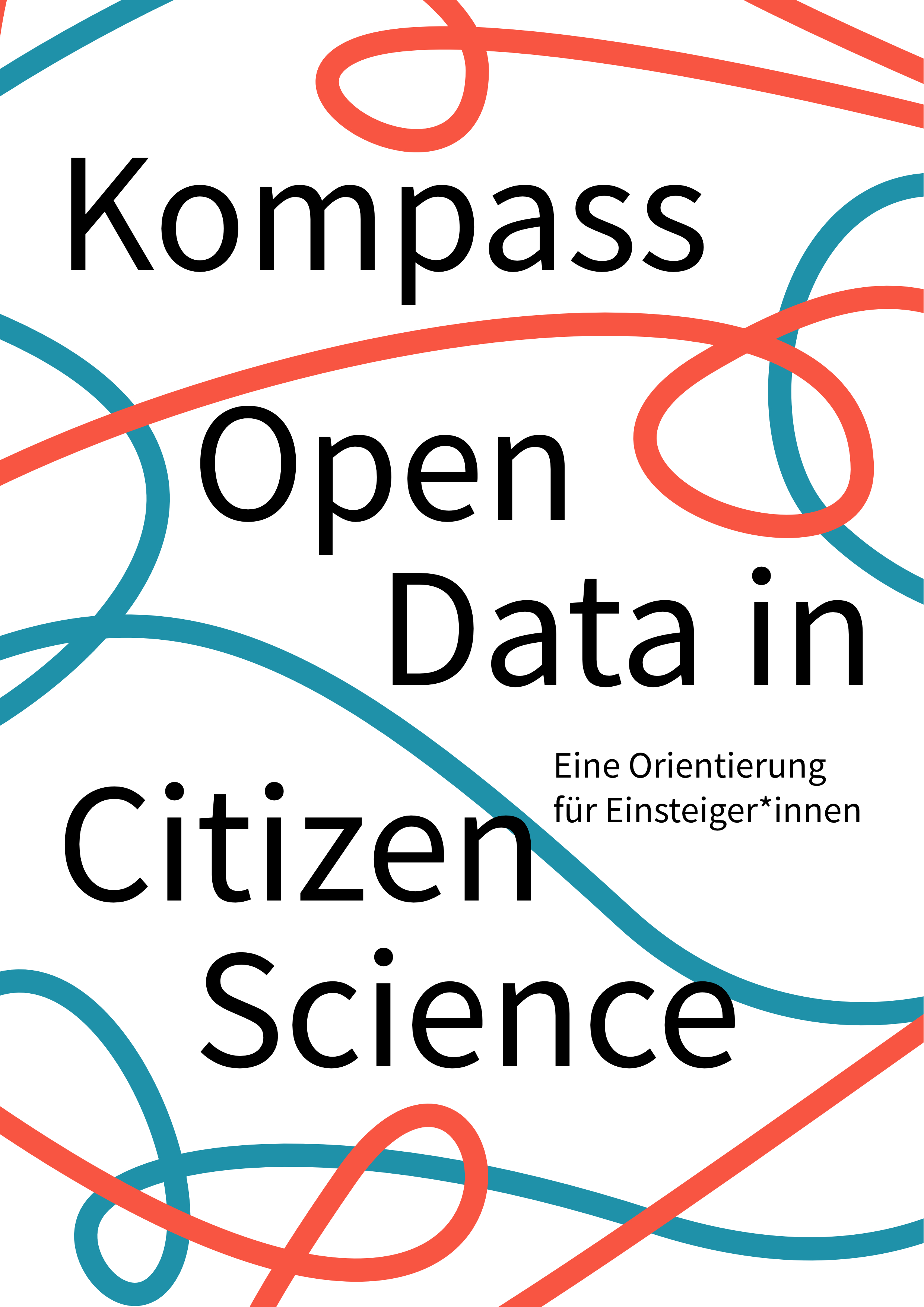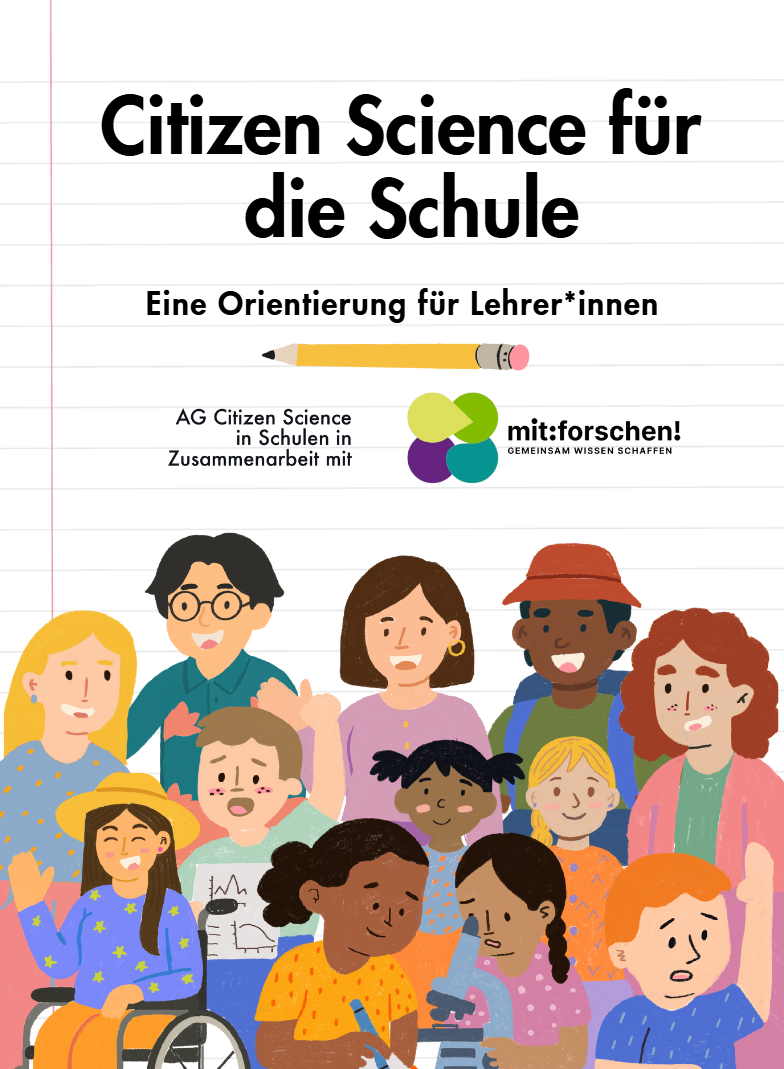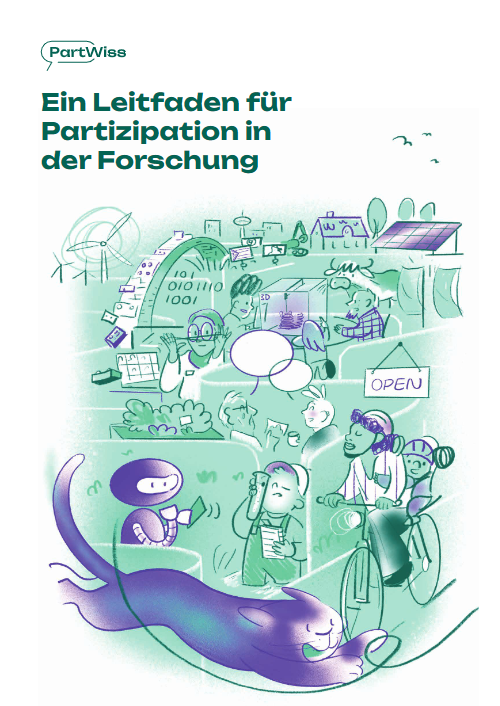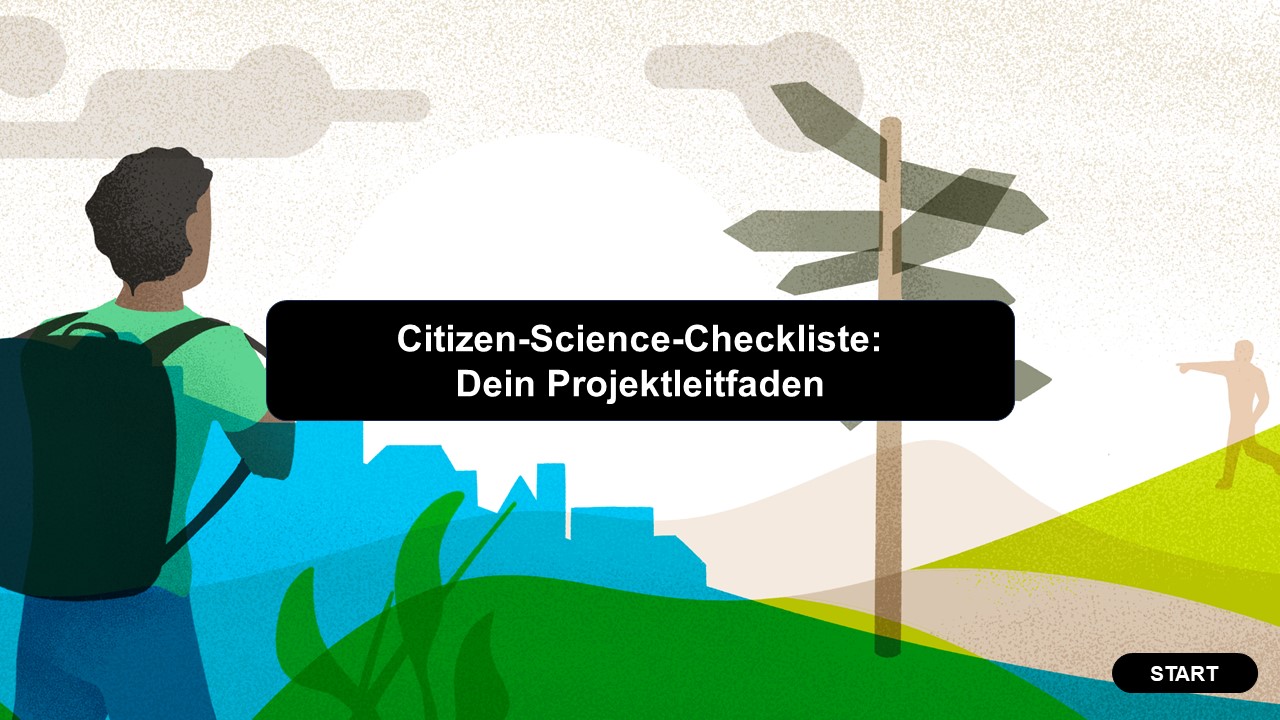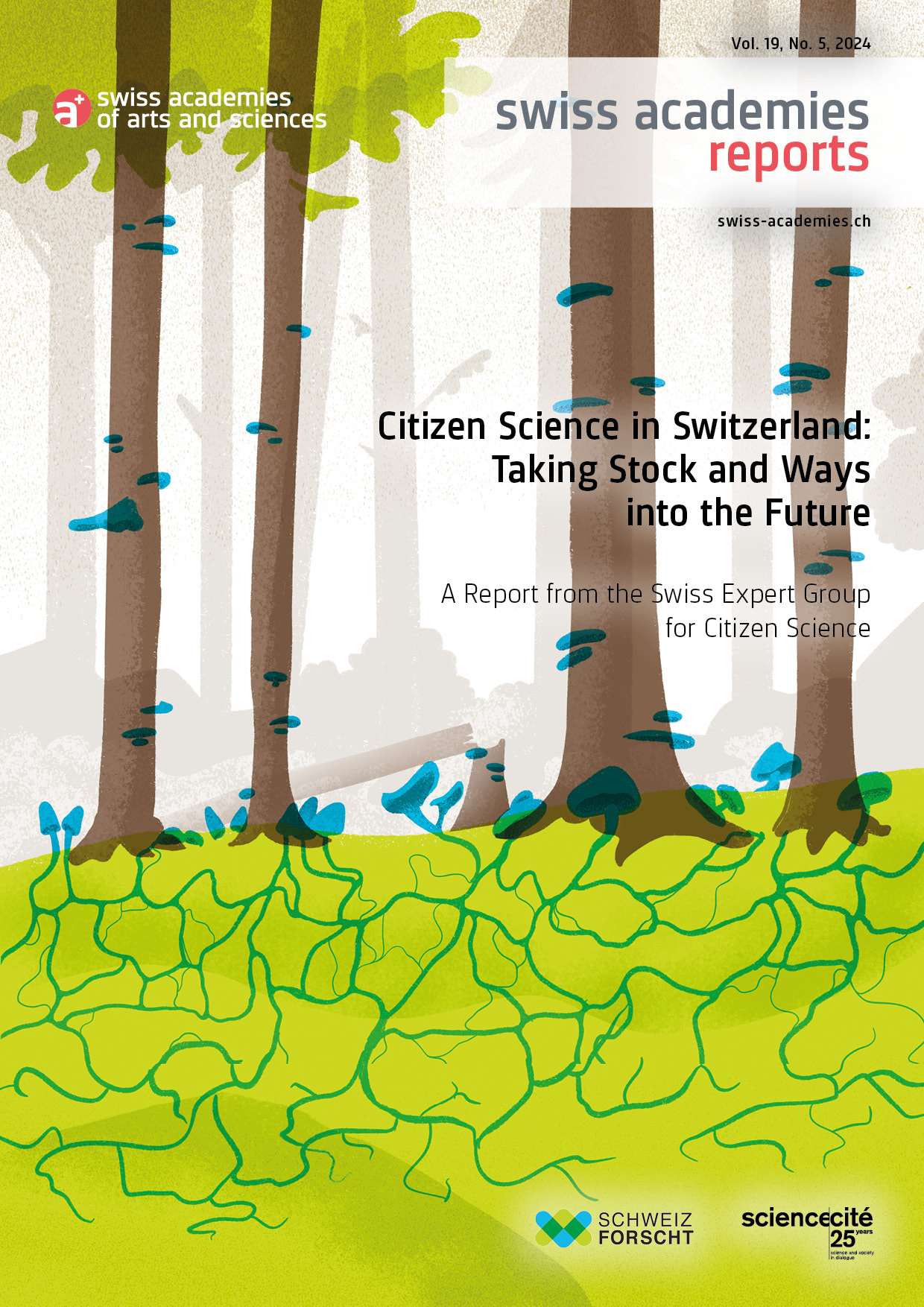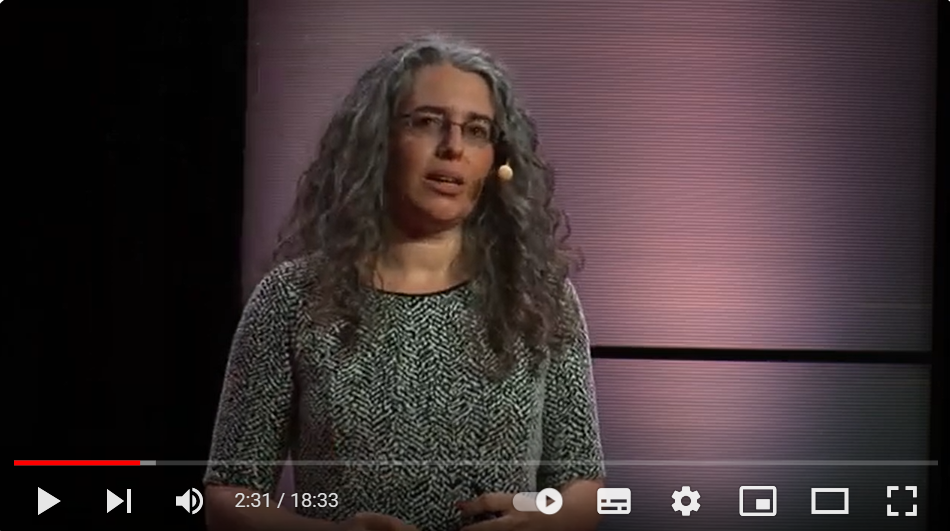Guidelines & Templates
Citizen Science is a dynamic field. New projects are continuously carried out; new articles are published in scientific journals; manuals and guides are being updated. Keeping track of it all is not so easy! On this page we compile some resources for you that we find particularly useful.
We update this collection regularly. If you have discovered an exciting tool or used a resource within a project that you found helpful, please feel very welcome to share them with us via e-mail at info@citizenscience.ch .
Guides and Manuals
|
|
Practicing Citizen Science in Zurich: HandbookPractical guide for the planning and implementation of Citizen Science projects. The handbook targets researchers. With specific tips for project teams in Zurich, this guide leads through the different stages of a Citizen Science project. Co-authored by Citizen Science Zurich (the former Citizen Science Center Zurich respectively) and other members of the community in Zurich.
|
|
|
Ethics guidelines in Citizen ScienceETH Zurich The aim of this report is to support the Competence Center Citizen Science Zurich. Starting out from the point of research oversight in the Swiss context, it gives an overview of existing ethics guidelines in citizen science as promoted by the Citizen Science Association (CSA), the European Citizen Science Association (ECSA) and similar organizations. It highlights the relative lack of attention to ethical governance and processes in current citizen science guidelines and recommends to set up an intra-institutional process to deal with ambiguities in the future.
|
|
|
Societal impact of transdisciplinary and participatory research: A guide for assessmentAG Wirkung der Gesellschaft für Transdisziplinäre und Partizipative Forschung (GTPF) Transdisciplinary and participatory research (TDPR) is characterised by its intention to achieve not only scientific but also societal impact. This raises the questions: What is societal impact? How can the impact potential of TDPR be assessed? In an interdisciplinary team, we have developed a guide that identifies criteria and exemplary indicators for assessing societal effects and impact potential in TDPR.
|
|
|
Kompass Open Data in Citizen Science – Eine Orientierung für Einsteiger*innen (German)Die Citizen Science D-A-CH-AG Die Anforderungen an Citizen Science-Projekte sind hoch. Offene Daten – Open (Research) Data – gehören zentral dazu, um Transparenz und Nachhaltigkeit zu schaffen. Open Data-Prinzipien sollten bei Citizen Science-Projekten von Beginn an mitgedacht werden. Um das zu erleichtern, bietet der Kompass Open Data in Citizen Science einen roten Faden für den Einstieg. Als Kompass leitet er durch Grundlagen und wichtige Erkenntnisse zum Thema Open Data. Zum vertieften Navigieren schliesst sich ein Glossar mit Begriffserklärungen, Hinweisen und Verweisen auf relevante Tools an – von Themen wie Anonymisierung und digitale Ethik bis hin zu Repositorien wie Zenodo.
|
|
|
Citizen Science für alle. Eine Handreichung für Citizen Science-Beteiligte (German)von mit:forschen! Gemeinsam Wissen schaffen Welche Aspekte muss ich bei der Entwicklung meines Citizen Science-Projekts beachten, wie gewinne ich Mitforschende und wie viel Zeit investiere ich in Kommunikation? Die Handreichung "Citizen Science für alle" ist ein praktischer Leitfaden mit Hinweisen und Tipps für alle, die ein Citizen-Science-Projekt planen oder durchführen. Ein Organigramm zeigt, welche Schritte wichtig sind und welche Leitfragen dabei helfen. Bürger schaffen Wissen BsW gehört zu unseren wertvollsten Netzwerkpartnern im deutschsprachigen Raum. Wir verweisen jeweils auf aktuelle Angebote von BsW und involvieren Mitglieder von BsW als Gastredner*innen in unsere Angebote.
|
|
|
Kursbuch Wirkung (German)von Phineo, einem gemeinnützigen Analyse- und Beratungshaus Das Kursbuch Wirkung hilft Projektverantwortlichen, ihr Projekt von Anfang an mit grösstmöglicher Wirkung zu planen, Ziele und Zielgruppen genau zu definieren, eine Wirkungslogik für ihr Projekt zu entwickeln, die erzielte Wirkung zu analysieren und zu "messen", ihr Projekt adressatengerecht zu kommunizieren und zu vermarkten. Es wurde finanziell durch die Bertelsmann Stiftung ermöglicht.
|
|
|
Leitfaden für die Veranstaltungsorganisation in Citizen Science (German)von mit:forschen! Gemeinsam Wissen schaffen Dieser Leitfaden gibt einen Überblick zu den wichtigsten Fragen für die Veranstaltungsplanung und geht auf die vier Phasen einer Veranstaltung ein: Konzeptualisierung, Planung, Durchführung und Nachbereitung. Er richtet sich an all jene, die eine Veranstaltung im Citizen Science-Kontext planen. (Weitere Informationen zu Bürger schaffen Wissen: siehe oben)
|
|
|
td-net toolboxtd-net (Network for Transdisciplinarity Research) We recommend the Toolbox to everyone involved in or planning Citizen Science projects and who is engaged in the co-production of knowledge in the context of social challenges. It provides an overview of the methods that can be used to master a wide range of challenges. For more detailed information, a contact person is listed in each case. Citizen Science Zurich cooperates with td-net for its course offerings: Selected methods from the td-net toolbox are presented on «Methods on Monday».
|
|
|
Instrumentenkoffer für inklusive Citizen Science (German)von Sozialheld*innen e.V. und Technische Universität Dortmund Der Instrumentenkoffer wurde im Rahmen des Projekts IncluScience – Disability Mainstreaming in Wissenschaft und Praxis erstellt und ist voll von Instrumenten, die auch Laien schnell nutzen können. Er umfasst die in diesem Projekt durchgeführten Verfahren, die für andere Citizen-Science-Projekte und Vorhaben, insbesondere für die Partizipation von Menschen mit Behinderungen, aufbereitet wurden.
|
|
|
Das Co-Creation Toolbook (German)von der FH Münster Dieses Handbuch ist die begleitende Publikation zur "Co-Creation Toolbox" der FH Münster (siehe Bereich "Tools und Toolboxen" weiter unten). Im Leitfaden werden Methoden und Instrumente für die Zusammenarbeit zwischen Experten*innen und Stakeholdern aus Wissenschaft und Praxis vorgestellt. Die Methoden sind dem Aufbau eines Projekts folgend strukturiert, also von Projektbeginn über Projektdurchführung hin zu Projektabschluss. Die Vorstellung der Methoden (bspw. Kompetenz Sonne, World Café) wird durch Tipps aus der Praxis ergänzt.
|
|
|
Organisiert euch! Handbuch (German)von Urban Equipe und Kollektiv Raumstation (Hrsg.) Wie organisiert man eine Gruppe? Wie werden Themen festgelegt, wie Geld verwaltet, wie geht man mit Konflikten um? Dieses Handbuch enthält 350 Seiten praktisches Wissen von über 30 aktiven Personen aus mehr als 20 Kollektiven aus der Schweiz, Österreich und Deutschland. Es beinhaltet Tipps für Gruppenbildung, Anleitungen für Projektleitung und Beispiele aus dem Alltag der engagierten Kollektive. Wir empfehlen das Buch sowohl für Anfänger*innen als auch Fortgeschrittene. Die Urban Equipe ist ein Zusammenschluss aus Urbanist*innen, Raumplaner*innen und sonstigen Enthusiast*innen, die sich für konkrete Mitwirkung in der Stadtentwicklung einsetzen. Die Urban Equipe ist als nicht-gewinnorientierter Verein organisiert. Das Kollektiv Raumstation ist eine interdisziplinäre Plattform und Impulsgeberin mit dem Ziel, den städtischen Raum zu hinterfragen und neu zu verhandeln. Die Raumstation arbeitet mit experimentellen Raumerkundungsmethoden, künstlerisch-aktivistischen Interventionen und aktivierenden Prozessen. 2013 in Weimar gegründet, ist das Kollektiv heute auch in Wien, Berlin und Zürich tätig.
|
|
|
Swiss Citizen Science PrinciplesSchweiz forscht Based on the 10 Principles for Citizen Science of the ECSA, the Swiss Citizen Science Principles provide a common basis and orientation for the Swiss Citizen Science community. The principles, published in spring 2022, are intended to serve as guidelines for all actors (e.g. researchers, citizens, funding organisations, politicians). In particular, project managers will be encouraged to reflect critically on their projects and to exploit the full potential of participatory approaches. Schweiz forscht is one of our most important network partners in Switzerland. Citizen Science Zurich has collaborated on the 10 principles.
|
|
|
10 Principles of Citizen ScienceEuropean Citizen Science Association ECSA The principles listed here were developed in the ECSA Working Group on Sharing Practice Experiences and Capacity Development. The goal was to agree on core statements that ECSA members think are prerequisites for good practice in Citizen Science. The principles have been translated into numerous languages. Citizen Science Zurich is a member of ECSA and contributes to the European community in various working groups.
|
|
|
LIBER guideGuide by the LIBER Citizen Science Working Group The guide aims to support the implementation of Citizen Science projects in research libraries. Short theoretical inputs are given and illustrated by practical examples. The first part (of a total of four parts) covers project planning and management, communication, research data management, FAIR data, data security and protection, and increasing citizens' understanding of scientific working methods as a basis for co-creating projects. The Zentralbibliothek Zürich, our network partner, is the author of the English-language guide, which has also been incorporated into our «Online Workshop für Bibliotheken und Archive».
|
|
|
Planung und Durchführung partizipativer Forschungsprojekte in der Alternsforschung: Ein Handbuch für Forschende (German)von Susanne Nieke und Stefanie Eicher, Zentrum für Gerontologie, Universität Zürich Dieses praxisnahe Handbuch verfolgt zwei Ziele: Erstens die am Zentrum für Gerontologie gemachten Erfahrungen mit partizipativer Forschung systematisch zusammenzustellen und aufzuarbeiten und zweitens diese weiterzugeben, um den partizipativen Ansatz in der Alternsforschung zu stärken und weiter zu etablieren. Es richtet sich vorrangig an akademisch Forschende, die sich mit Alternsforschung beschäftigen und ein partizipatives Forschungsprojekt initiieren, leiten oder daran mitarbeiten wollen.
|
|
|
PPIE – Patient and Public Involvement and EngagementOpen Innovation in Science Center, Ludwig Boltzmann Gesellschaft, Wien
Practical guide for researchers on how to involve patients and the public (PPIE) in research. Suitable for research on medical topics, e.g. also from a social science perspective. The guide includes different perspectives of all stakeholders involved and serves as a central entry point for research based on PPIE principles. In this document, you find a detailed description of what PPIE stands for, as well as self-assessment checklists and other resources. Link (Download of PDFs starts immediately)
|
|
|
Citizen Science – Forschen mit Schulen (German)von OeAD – Zentrum für Citizen Science Diese Broschüre mit Grundlagen, Empfehlungen und praktischen Tipps für gemeinsame Projekte mit Schulen wurde von 16 Lehrpersonen und Forschenden verfasst und beinhaltet Erfahrungen von 20 Jahren Zusammenarbeit zwischen Wissenschaft und Schulen in Österreich. Damit stellt die Broschüre einen Querschnitt durch die unterschiedlichen Arbeitsbereiche dar, die es bei der Durchführung von Citizen Science-Projekten an Schulen zu berücksichtigen gilt – mit dem Ziel, Citizen Science als festen Bestandteil in Lehrplänen zu etablieren.
|
|
|
Citizen Science mit Schulen (German)von mit:forschen! Gemeinsam Wissen schaffen Dieser Leitfaden richtet sich an Koordinierende von Citizen-Science-Projekten. Er soll dazu ermutigen, Citizen-Science-Projekte mit Schüler*innen zu entwickeln und umzusetzen sowie bestehende Projekte zu erweitern, um eine Zusammenarbeit mit Schulen zu ermöglichen.
|
|
|
Citizen Science für die Schule! Eine Orientierung für Lehrer*innen (German)von mit:forschen! Gemeinsam Wissen schaffen Dieses Heft wurde für Lehrer*innen geschrieben und zeigt vielfältige Teilnahmemöglichkeiten an Citizen Science anhand von Projektbeispielen, stellt Mehrwerte dieses partizipativen Forschungsansatzes dar und gibt praktische Tipps zur Umsetzung in der Schule.
|
|
|
Citizen Science im Museum (German)vom Verband der Museen der Schweiz Die Broschüre ermöglicht einen Einblick in die Eigenarten, den Ablauf und die wichtigsten Akteursgruppen von Citizen Science. Praktische Instrumente zur Umsetzung eines Citizen Science-Projektes, mögliche Stolpersteine und inspirierende Beispiele aus den Museen sollen anregen, eigene partizipative Forschungsprojekte umzusetzen oder sich daran zu beteiligen.
|
|
|
Route Planner for Citizen Science in museums (German, French)from Catta Gmbh, Schweiz forscht und Stiftung für Kunst, Kultur und Geschichte Where do you start when planning a Citizen Science project? Which steps are important? And what do you need to pay attention to? This route planner will help you navigate through the most important steps in project planning. It is also ideal for planning Citizen Science projects in areas other than museums. It was designed by our colleagues at Catta Gmbh, Schweiz forscht and the Foundation for Art, Culture and History.
|
|
|
Ein Leitfaden für Partizipation in der Forschung (German)von Projekt PartWiss Dieser Leitfaden richtet sich an alle, die sich mit partizipativen Projekten befassen – ob in der Forschung, Praxis oder an der Schnittstelle beider Bereiche.
|
Tools and Templates
|
|
Citizen Science Checklistfrom Citizen Science Zurich and Schweiz forscht Based on the ten Swiss Citizen Science Principles, this interactive checklist supports you in the planning and implementation of participatory research projects. It offers important reflection questions, valuable tips and helpful resources.
|
|
|
Template for Impact Narrativefrom Citizen Science Zurich This template helps project teams to write a convincing impact narrative after project completion and to communicate it to the target group. With detailed step-by-step explanations and examples. Link to the template with instructions
|
|
|
Reflections on successful cooperationfrom Citizen Science Zurich, University of Zurich and University of Konstanz What does it take for project-based collaboration in small groups to succeed? Based on our experience with various teaching formats, we have compiled a compact collection of questions. It covers the most important topics for determining how collaboration should be structured right from the start of a project.
|
|
|
Templates for proof of competencefrom Citizen Science Zurich It is very important to document the skills acquired in Citizen Science projects. To make the work of project managers easier, we have created sample certificates and templates that can be downloaded and used.
|
|
|
Template for assignment agreementfrom Citizen Science Zurich When collaborating with Citizen Scientists, it can be useful to record the most important points of the collaboration. To make your work easier, we have created a template which you can use.
|
|
|
Td-net toolboxtd-net (Network for Transdisciplinarity Research) We recommend the Toolbox to everyone involved in or planning Citizen Science projects and who is engaged in the co-production of knowledge in the context of social challenges. It provides an overview of the methods that can be used to master a wide range of challenges. For more detailed information, a contact person is listed in each case. Citizen Science Zurich cooperates with td-net for its course offerings: Selected methods from the td-net toolbox are presented on «Methods on Monday» .
|
|
|
Living Knowledge ToolboxLiving Knowledge – The International Science Shop Network This toolbox aims to enable people working in community-based research or in so-called "science stores" to develop professional standards and optimise their practice through professional know-how. The database contains various documentations of processes as well as guides that provide appropriate knowledge and methods for each process step. The guide is directed at researchers and employees in the public sector and NGOs.
|
|
|
Co-Creation Toolbox (German)von der FH Münster Was ist wichtig, wenn man einen ko-kreativen Prozess plant? Ein Team von Wissenschaftler*innen der FH Münster hat eine Toolbox entwickelt, die mögliche Hemmnisse für die Zusammenarbeit identifiziert und Methoden zur Überwindung jener Hürden bereitstellt. Link zur Publikation über die Toolbox (PDF)
|
|
|
Emotions in Engagement ToolkitCollaborative Futures Academy 2024 Hope, fear, frustration,curiosity… Emotions are everywhere when we bring together publics and communities with research. How can we navigate and manage these emotional experiences? and how do we develop a culture of care towards our participants, partners and ourselves within public engagement? This practice guide collects insights, reflections and activities from contributors and participants of the Collaborative Futures Academy 2024, an international three day online space of learning and exchange. |
Platforms
|
|
Citizen Science Zurich: Citizen Science ToolsOn our "Citizen Science Tools" platform, we offer a range of tools that support scientists and citizens in carrying out projects based on digital data. You can also find current projects listed on the platform where you can participate.
|
|
|
Schweiz forschtWhich Citizen Science projects are currently running in Switzerland? Where can you get involved as an interested citizen? On the Schweiz forscht platform you will find a list of current and past projects in which you can participate or be inspired by. If you are already part of a project team, we recommend that you submit your project for publication and thus make it visible throughout Switzerland.
|
|
|
Österreich forschtThe equivalent to Schweiz forscht is the platform Österreich forscht. For some listed projects, you can participate even if you are not in Austria.
|
|
|
mit:forschen! Gemeinsam Wissen schaffen"mit:forschen! Gemeinsam Wissen schaffen" (formerly "Bürger schaffen Wissen") is the central platform for Citizen Science in Germany. Here, too, online participation from Switzerland is possible for individual projects.
|
|
|
EU-Citizen.ScienceEU-Citizen.Science is an online platform for sharing knowledge, methods, training and resources - by the Citizen Science community, for the community. The vision for the platform is to serve as a knowledge hub to support the mainstreaming of citizen science.
|
|
|
ZooniverseZooniverse is the world's largest platform for Citizen Science research projects with 2.5 million registered users (as of June 2022). Zooniverse grew out of a single Citizen Science project, Galaxy Zoo, in which participants classified galaxies. On Zooniverse, you can both register as a Citizen Scientist or upload your own project for others to join. The platform is run by the Citizen Science Alliance .
|
|
|
iNaturalistiNaturalist is a platform for sharing, identifying, and mapping plants and animals. As a Citizen Scientist, you can use iNaturalist to connect with more than one million scientists and naturalists who can help you identify a species of fungus, for example. By sharing your observations, you also create important research data for scientists. As a researcher, you can create a project on the platform that others can join - such as "Moths of Switzerland", which collects all moth species found in Switzerland. iNaturalist can be accessed as a website or app. It is a joint initiative of the California Academy of Sciences and the National Geographic Society.
|
|
|
Science BoosterOn the crowdfunding platform We Make It you can present your project online to a large audience and finance it together with many supporters. You will receive support from the Science Booster team.
|
|
|
SPOTTERONSPOTTERON is a universally applicable system for smartphone apps in the field of Citizen Science, nature observation, social communities and environmental protection. It allows users to quickly and easily document and submit entries on specific topics. With the smartphone, sightings and contributions can be collected on the go and made available to research groups, administrations or environmental protection organizations.
|
Research on Citizen Science
|
|
Citizen Science in Switzerland: Taking Stock and Ways into the FutureThe publication provides a basis for a common understanding of Citizen Science and serves as a starting point for future Citizen Science initiatives in Switzerland. In addition to a general review of the current situation, the report goes into more detail on the four topics of added value and impact, funding, training, communication and visibility. It contains numerous best-practice examples, tools and overview lists. Citizen Science practitioners, universities, non-academic institutions, ad hoc working groups, coordination offices and funding organizations are each addressed with specific goals and measures. The report was produced as part of the Citizen Science initiative of the Swiss Academies of Arts and Sciences 2021-24 and was coordinated by Science et Cité. Olivia Höhener and Rosy Mondardini are co-authors of the publication as part of the Swiss Expert Group for Citizen Science.
|
|
|
The potential of making competences acquired through Citizen Science visibleThe following article reflects on the competences acquired in Citizen Science and their visibility. It is based on a workshop at the Austrian Citizen Science Conference in June 2022, where it was shown that the acquisition of competences in Citizen Science projects is rarely discussed at project level, neither in relation to citizen scientists nor for academic scientists. Concepts, tools and practices existing in the D-A-CH region to valorize competences acquired through Citizen Science were collected, opportunities and challenges were addressed. Recommendations formulated during the workshop conclude the article. The article was written in the context of the Austrian Citizen Science Conference 2022. Our Managing Director Olivia Höhener and Tiina Stämpfli from the Swiss Citizen Science Network - Schweiz forscht are authors of the article.
|
|
|
Partizipative Forschung Schweiz. Forschungsbericht einer nationalen Befragungsstudie (German)Diese repräsentative Studie untersuchte erstmals die Bereitschaft der Schweizer Gesamtbevölkerung, sich an Forschung zu beteiligen. Unsere ehemalige Kollegin Susanne Tönsmann war Co-Autorin der Studie. Seifert, Alexander, Anna Yerim Yang, Susanne Tönsmann and Mike S. Schäfer, 2021. Partizipative Forschung Schweiz. Forschungsbericht einer nationalen Befragungsstudie [online]. Olten: FHNW. Verfügbar unter: http://dx.doi.org/10.26041/fhnw-3926
|
|
|
Early Career Researchers’ Perspective on Citizen ScienceHow do early career researchers (ECR) perceive Citizen Science? What are the particular challenges for researchers at this career stage? This paper addresses the question of how Citizen Science is perceived in the scientific community. It discusses the results of a Citizen Science Winter School held in Zurich. The article was written in the context of the Austrian Citizen Science Conference 2020. Our former colleagues Petra Biberhofer and Susanne Tönsmann are co-authors of the study. Biberhofer, Petra; Lembke-Ibold, Birte; Tönsmann, Susanne (2020). Early Career Researchers’ Perspective on Citizen Science. In: Austrian Citizen Science Conference 2020 - ACSC2020, Vienna, 14 September 2020 - 16 September 2020, PoS.
|
|
|
Rethinking Science and Public ParticipationA completed interdisciplinary research project on the transformation of public participation in science by Bruno Strasser, University of Geneva. The project ran for five years. Bruno Strasser is one of the most important researchers on Citizen Science in Switzerland and also a former member of our advisory board.
|
|
|
Wissenschaftsbarometer Schweiz (German)Das Langzeitprojekt Wissenschaftsbarometer Schweiz erhebt, über welche Kanäle, in welcher Form und wie häufig Schweizer Bürger*innen mit wissenschaftlichen Themen in Kontakt kommen. Zudem wird untersucht, wie bestimmte Informationsquellen (Facebook, Twitter, aber auch Freund*innen/Familie) die Sicht auf Wissenschaft beeinflussen. Die Befragungen finden alle drei Jahre statt. Somit können aktuelle Wandlungsprozesse nachvollzogen und Zusammenhängen zwischen der Kommunikation einerseits und der Nutzung und Reaktion andererseits aufgezeigt werden.
|
|
|
Vertiefungsstudie zum "Wissenschaftsbarometer Schweiz" (German)Im Wissenschaftsbarometer wurden vier Typen von Schweizer Bürger*innen identifiziert hinsichtlich ihrer Sicht auf Wissenschaft ("Science-Philes", "kritisch Interessierte", "passive Unterstützer" und "Distanzierte"). Diese vier Rezipiententypen wurden in der Vertiefungsstudie genauer untersucht, wobei die Proband*innen ein elektronisches Tagebuch führten. Die Vertiefungsstudie lief unter der Leitung von Dr. Carmen Koch, ZHAW. Hier finden Sie eine Liste mit sechs verschiedenen Publikationen, die auf Grundlage der Vertiefungsstudie zum Wissenschaftsbarometer heraus entstanden sind.
|


